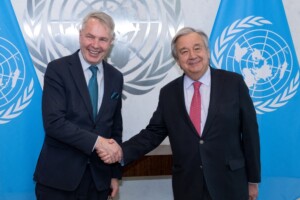Al Bashir escape: ‘Sad day for South Africa, a blow to the rule of law’
The narrow escape of President Omar Al Bashir fleeing from an immediate arrest and possible hand-over to the ICC stirs international anger.
The narrow escape of President Omar Al Bashir fleeing from an immediate arrest and possible hand-over to the International Criminal Court has stirred international anger.
“This is a sad day for South Africa and a blow to the rule of law,” says Anton du Plessis, managing director of the International Institute for Strategic Studies (IISS). “Until now, the country has been a champion of international justice and has done more than most in Africa to make sure victims get justice.”
The International Criminal Court's chief deputy-prosecutor James Stewart told AFP on Monday that South Africa's failure to arrest Al Bashir was "disappointing": "…disappointed that he was not arrested. Our position has always been that South Africa's obligation is clear and unequivocal. It had an obligation to arrest him."
UN Secretary-General Ban Ki-moon added his voice to local and international condemnation of the South African government’s failure to act, saying that signatories to the International Criminal Court's (ICC) Rome Statute must carry out the warrant for Al Bashir’s arrest.
The Executive Director of the International Bar Association (IB) Mark Ellis said today, in relation to current events surrounding the Sudanese President and South Africa:
"Too often, [Rome Statute] State Parties have refused to take action against Al Bashir, allowing him to remain at liberty for over six years since first being indicted by the ICC. South Africa now has an opportunity to reverse this trend and to prove to the world its unequivocal support for justice and accountability."
"The ICC should rely on civil society in the absence of the cooperation from governments."
IISS researcher, Allan Ngari: “South Africa’s refusal to arrest Al Bashir is a major setback for the ICC, but the court is not about one country. And as events in South Africa show, the ICC may need to rely more on civil society in the absence of cooperation from governments.”
Still, “It is completely unacceptable. The South African government has been complicit in assuring Mr Bashir is able to flee the country," Democratic Alliance Chief Whip John Steenhuisen told Reuters, calling for "heads to roll". “Our international reputation lies in tatters," the South African MP added.
“The world stood with South Africa to fight apartheid but it stands for impunity for mass murder of Africans,” says Kenneth Roth, director of Human Rights Watch. “South Africa has shamefully flouted ICC and domestic court to free a man wanted for mass murder of Africans,” he added.
The US state department added its voice, saying it is disappointed that South Africa failed to prevent Al Bashir from leaving the country.
Al Bashir's supporters celebrate
In Khartoum, the supporters of President Al Bashir celebrated his return to the Sudanese capital by carrying a coffin, wrapped in sheets with 'Laying the ICC to its final rest' written on them.
Sudan's Foreign Minister Ibrahim Ghandour said that South Africa's government assured them that the President's participation at the 25th Africa Union summit was a source of "pride", Reuters news agency reports.
President Omar Al Bashir was in South Africa for the summit, when the Pretoria High Court issued an interim order that prevented him from leaving, until a ruling was made on whether he should be arrested to stand trial at the ICC.
Under Rome Statute Article 25(3)(a), Al Bashir faces ten counts on the basis of his individual criminal responsibility as an indirect (co) perpetrator, including five counts of crimes against humanity, two counts of war crimes, and three counts of genocide. The investigation into the crimes in Darfur by the ICC have been put on hold, however, owing to a lack of action by the UN Security Council.
The Hague-based court indicted Al Bashir in 2009 for five counts of crimes against humanity and two counts of war crimes, and in 2010 for three counts of genocide. It has also charged former Defence Minister Abdelrahim Mohamed Hussein (now Governor of Khartoum state), former Interior Minister Ahmed Haroun (currently Governor of North Kordofan), and Janjaweed militia leader Ali Kushayb. None have been arrested.











 and then
and then